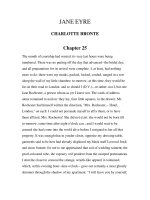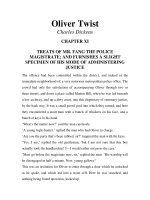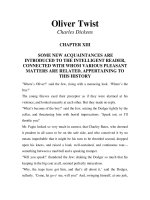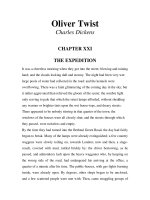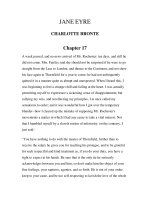LUYỆN ĐỌC TIẾNG ANH QUA TÁC PHẨM VĂN HỌC-THE ADVENTURES OF TOM SAWYER CHAPTER 35
Bạn đang xem bản rút gọn của tài liệu. Xem và tải ngay bản đầy đủ của tài liệu tại đây (24.36 KB, 9 trang )
THE ADVENTURES OF TOM SAWYER
CHAPTER 35
THE reader may rest satisfied that Tom's and Huck's windfall made a mighty
stir in the poor little village of St. Petersburg. So vast a sum, all in actual
cash, seemed next to incredible. It was talked about, gloated over, glorified,
until the reason of many of the citizens tottered under the strain of the
unhealthy excitement. Every "haunted" house in St. Petersburg and the
neighboring villages was dissected, plank by plank, and its foundations dug
up and ransacked for hidden treasure -- and not by boys, but men -- pretty
grave, unromantic men, too, some of them. Wherever Tom and Huck
appeared they were courted, admired, stared at. The boys were not able to
remember that their remarks had possessed weight before; but now their
sayings were treasured and repeated; everything they did seemed somehow
to be regarded as remarkable; they had evidently lost the power of doing and
saying commonplace things; moreover, their past history was raked up and
discovered to bear marks of conspicuous originality. The village paper
published biographical sketches of the boys.
-321-
The Widow Douglas put Huck's money out at six per cent., and Judge
Thatcher did the same with Tom's at Aunt Polly's request. Each lad had an
income, now, that was simply prodigious -- a dollar for every week-day in
the year and half of the Sundays. It was just what the minister got -- no, it
was what he was promised -- he generally couldn't collect it. A dollar and a
quarter a week would board, lodge, and school a boy in those old simple
days -- and clothe him and wash him, too, for that matter.
Judge Thatcher had conceived a great opinion of Tom. He said that no
commonplace boy would ever have got his daughter out of the cave. When
Becky told her father, in strict confidence, how Tom had taken her whipping
at school, the Judge was visibly moved; and when she pleaded grace for the
mighty lie which Tom had told in order to shift that whipping from her
shoulders to his own, the Judge said with a fine outburst that it was a noble,
a generous, a magnanimous lie -- a lie that was worthy to hold up its head
and march down through history breast to breast with George Washington's
lauded Truth about the hatchet! Becky thought her father had never looked
so tall and so superb as when he walked the floor and stamped his foot and
said that. She went straight off and told Tom about it.
Judge Thatcher hoped to see Tom a great lawyer or a great soldier some
day. He said he meant to look to it that Tom should be admitted to the
-322-
National Military Academy and afterward trained in the best law school in
the country, in order that he might be ready for either career or both.
Huck Finn's wealth and the fact that he was now under the Widow
Douglas' protection introduced him into society -- no, dragged him into it,
hurled him into it -- and his sufferings were almost more than he could bear.
The widow's servants kept him clean and neat, combed and brushed, and
they bedded him nightly in unsympathetic sheets that had not one little spot
or stain which he could press to his heart and know for a friend. He had to
eat with a knife and fork; he had to use napkin, cup, and plate; he had to
learn his book, he had to go to church; he had to talk so properly that speech
was become insipid in his mouth; whithersoever he turned, the bars and
shackles of civilization shut him in and bound him hand and foot.
He bravely bore his miseries three weeks, and then one day turned up
missing. For forty-eight hours the widow hunted for him everywhere in great
distress. The public were profoundly concerned; they searched high and low,
they dragged the river for his body. Early the third morning Tom Sawyer
wisely went poking among some old empty hogsheads down behind the
abandoned slaughter-house, and in one of them he found the refugee. Huck
had slept there; he had just breakfasted upon some stolen odds and ends of
food, and was lying off, now, in comfort, with his pipe. He was unkempt,
-323-
uncombed, and clad in the same old ruin of rags that had made him
picturesque in the days when he was free and happy. Tom routed him out,
told him the trouble he had been causing, and urged him to go home. Huck's
face lost its tranquil content, and took a melancholy cast. He said:
"Don't talk about it, Tom. I've tried it, and it don't work; it don't work,
Tom. It ain't for me; I ain't used to it. The widder's good to me, and friendly;
but I can't stand them ways. She makes me get up just at the same time every
morning; she makes me wash, they comb me all to thunder; she won't let me
sleep in the woodshed; I got to wear them blamed clothes that just smothers
me, Tom; they don't seem to any air git through 'em, somehow; and they're
so rotten nice that I can't set down, nor lay down, nor roll around anywher's;
I hain't slid on a cellar-door for -- well, it 'pears to be years; I got to go to
church and sweat and sweat -- I hate them ornery sermons! I can't ketch a fly
in there, I can't chaw. I got to wear shoes all Sunday. The widder eats by a
bell; she goes to bed by a bell; she gits up by a bell -- everything's so awful
reg'lar a body can't stand it."
"Well, everybody does that way, Huck."
"Tom, it don't make no difference. I ain't everybody, and I can't stand it.
It's awful to be tied up so. And grub comes too easy -- I don't take no interest
in vittles, that way. I got to ask to go a-fishing; I got to ask to go in a-
swimming --
-324-
dern'd if I hain't got to ask to do everything. Well, I'd got to talk so nice it
wasn't no comfort -- I'd got to go up in the attic and rip out awhile, every
day, to git a taste in my mouth, or I'd a died, Tom. The widder wouldn't let
me smoke; she wouldn't let me yell, she wouldn't let me gape, nor stretch,
nor scratch, before folks -- " [Then with a spasm of special irritation and
injury] -- "And dad fetch it, she prayed all the time! I never see such a
woman! I had to shove, Tom -- I just had to. And besides, that school's
going to open, and I'd a had to go to it -- well, I wouldn't stand that, Tom.
Looky-here, Tom, being rich ain't what it's cracked up to be. It's just worry
and worry, and sweat and sweat, and a-wishing you was dead all the time.
Now these clothes suits me, and this bar'l suits me, and I ain't ever going to
shake 'em any more. Tom, I wouldn't ever got into all this trouble if it hadn't
'a' ben for that money; now you just take my sheer of it along with your'n,
and gimme a ten-center sometimes -- not many times, becuz I don't give a
dern for a thing 'thout it's tollable hard to git -- and you go and beg off for
me with the widder."
"Oh, Huck, you know I can't do that. 'Tain't fair; and besides if you'll try
this thing just a while longer you'll come to like it."
"Like it! Yes -- the way I'd like a hot stove if I was to set on it long
enough. No, Tom, I won't be rich, and I won't live in them cussed smothery
houses


